‘Providence’ Category
» posted on Saturday, October 26th, 2013 by Linda Lou Burton
Gravel Sucking Trucks
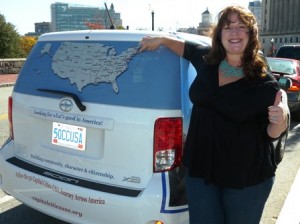
I met with Sandi in Providence. She visited all 50 state capitols before she was 25.
Now she’s going for 50 countries before she’s 50!
We celebrated as she returned from the 40th one.
Linda Burton posting from Providence, Rhode Island – Life is full of the unexpected. For instance, I didn’t plan to be working from the edge of the bathtub this Saturday morning. Yet here I sit, laptop on my lap, door closed to the outside world. Now, why is that? Because, just outside my window, just a few feet from my workdesk, is a gravel-sucking truck. And that truck is doing what it was designed to do. It is sucking gravel off the roof of my hotel. The manager explained. “I know it’s noisy, but we have to get the re-roofing done before winter sets in. We have to remove the gravel in order to put down a new layer of tar.” Well, I 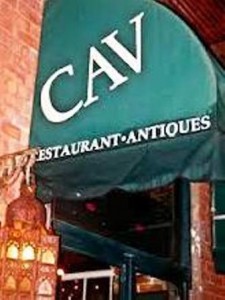 understand that. So I’ll spend the day exploring Providence, no prob. “You’ll be done soon?” was my plaintive question. Ah no, the work continues through next Wednesday. The gravel-sucking truck will be replaced by a tar-spreading truck. Swapping noise for the nose-burning smell of hot tar? I’d rather adjust life plans. Instead of spending another day with my friend Sandi; instead of leisurely wandering Water Place Park in downtown Providence; instead of having Sunday brunch at CAV as planned; I’ll shorten my Providence stay and move
understand that. So I’ll spend the day exploring Providence, no prob. “You’ll be done soon?” was my plaintive question. Ah no, the work continues through next Wednesday. The gravel-sucking truck will be replaced by a tar-spreading truck. Swapping noise for the nose-burning smell of hot tar? I’d rather adjust life plans. Instead of spending another day with my friend Sandi; instead of leisurely wandering Water Place Park in downtown Providence; instead of having Sunday brunch at CAV as planned; I’ll shorten my Providence stay and move 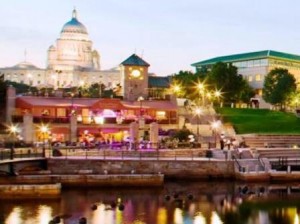 ahead to Hartford. I’ll use today to pack, and I’ll use today to summarize. I have company in this tiny bathroom. Alex and Jack crouched in the tub, watching me. If the sound of gravel rattling through a giant metal tube before crashing into the metal truck bed is deafening to me, I can only imagine how excruiating it must be to the cat’s sensitive ears. Suddenly I realized – 90% of the Journey Across America is done! “So Alex,” I said, slipping into interview mode, “what’s your favorite part of the Journey so far?” » read more
ahead to Hartford. I’ll use today to pack, and I’ll use today to summarize. I have company in this tiny bathroom. Alex and Jack crouched in the tub, watching me. If the sound of gravel rattling through a giant metal tube before crashing into the metal truck bed is deafening to me, I can only imagine how excruiating it must be to the cat’s sensitive ears. Suddenly I realized – 90% of the Journey Across America is done! “So Alex,” I said, slipping into interview mode, “what’s your favorite part of the Journey so far?” » read more
» posted on Monday, October 21st, 2013 by Linda Lou Burton
Messing Things Up
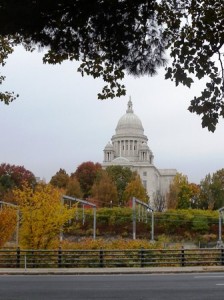 Linda Burton posting from Providence, Rhode Island —Changing the status quo can be messy. And Roger Williams (1603-1683) messed things up wherever he went. Roger didn’t mean to create problems, he meant to simplify. At least, that’s the way it’s interpreted now. Now he’s deemed a hero, a fighter for freedom, and, no small accomplishment – the founder of Rhode Island. The Roger Williams National Memorial, operated by the National Park Service, occupies 4.5 acres in downtown Providence, near the corner of Smith and North Main. The Rhode Island State House is just across the easy-flowing Moshassuck River, an impressive sight through the October-gold of the park’s trees. A pot of yellow mums sat by the building’s door; inside, a solemn wooden statue in patriotic blues and golds held a book. I started with the overview movie of Roger Williams’ life; I browsed
Linda Burton posting from Providence, Rhode Island —Changing the status quo can be messy. And Roger Williams (1603-1683) messed things up wherever he went. Roger didn’t mean to create problems, he meant to simplify. At least, that’s the way it’s interpreted now. Now he’s deemed a hero, a fighter for freedom, and, no small accomplishment – the founder of Rhode Island. The Roger Williams National Memorial, operated by the National Park Service, occupies 4.5 acres in downtown Providence, near the corner of Smith and North Main. The Rhode Island State House is just across the easy-flowing Moshassuck River, an impressive sight through the October-gold of the park’s trees. A pot of yellow mums sat by the building’s door; inside, a solemn wooden statue in patriotic blues and golds held a book. I started with the overview movie of Roger Williams’ life; I browsed 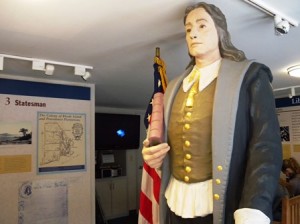 the exhibits, and the gift shop. The Park Ranger gave me a walking map, marking spots in Providence that were important to the Roger Williams story. Enough time inside; I headed for the First Baptist Church in America, a few blocks down Main Street. I passed the Hahn Memorial along the way, and the spring that was discovered by Roger Williams in the 1600s. Roger built his house nearby (although it no longer exists); that fresh-water spring sustained not only Roger and his family, but the settlers that followed. Judge Jacob Hahn donated the land for the park, and the memorial,
the exhibits, and the gift shop. The Park Ranger gave me a walking map, marking spots in Providence that were important to the Roger Williams story. Enough time inside; I headed for the First Baptist Church in America, a few blocks down Main Street. I passed the Hahn Memorial along the way, and the spring that was discovered by Roger Williams in the 1600s. Roger built his house nearby (although it no longer exists); that fresh-water spring sustained not only Roger and his family, but the settlers that followed. Judge Jacob Hahn donated the land for the park, and the memorial, 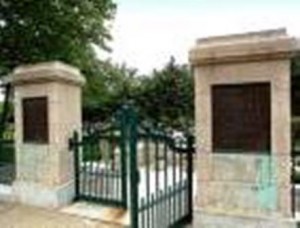 to the city of Providence in 1931; it was given in honor of his father Isaac Hahn, the first person of Jewish faith to be elected to public office from Providence. These items offer hints of what Roger Williams stood for, and that was “freedom of conscience.” Should I start at the beginning, or the end? » read more
to the city of Providence in 1931; it was given in honor of his father Isaac Hahn, the first person of Jewish faith to be elected to public office from Providence. These items offer hints of what Roger Williams stood for, and that was “freedom of conscience.” Should I start at the beginning, or the end? » read more
» posted on Saturday, October 19th, 2013 by Linda Lou Burton
Grandmother’s House
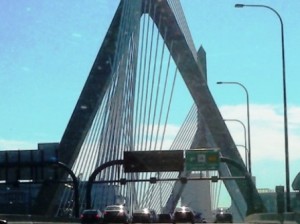 Linda Burton posting from Providence, Rhode Island – I went over the river and through the woods, but I wasn’t headed for grandmother’s house. I moved from Boston to Providence, Rhode Island today; capital city #45 on the Journey. The river I crossed was the Charles, on the new wing-cabled bridge that was built as part of the Big Dig. The day was October-perfect, but the heavy traffic prevented me from looking left, or right, to see the Charles, where the Head of the Charles Regatta was underway, the world’s largest two-day rowing event. The road dipped into the Big Dig tunnel, where there was nothing to see but tail lights. Out of the worm-hole and back
Linda Burton posting from Providence, Rhode Island – I went over the river and through the woods, but I wasn’t headed for grandmother’s house. I moved from Boston to Providence, Rhode Island today; capital city #45 on the Journey. The river I crossed was the Charles, on the new wing-cabled bridge that was built as part of the Big Dig. The day was October-perfect, but the heavy traffic prevented me from looking left, or right, to see the Charles, where the Head of the Charles Regatta was underway, the world’s largest two-day rowing event. The road dipped into the Big Dig tunnel, where there was nothing to see but tail lights. Out of the worm-hole and back  into daylight on I-93; the train went by on my right, the T. Remember that Kingston Trio song back in ‘59 about poor old Charlie? Did he ever return? No he never returned and his fate is still unlearn’d. He may ride forever ‘neath the streets of Boston, he’s the man who never returned. Would I ever return? As I hummed the song, trying to remember the gist of it, the outdoor scene transitioned from urban to woodlands. The Massachusetts hills were glowing gold; no need to go to New Hampshire for fall color. Stay home! Signs for Foxboro caught my attention; ah yes, Gillette Stadium is there; home of
into daylight on I-93; the train went by on my right, the T. Remember that Kingston Trio song back in ‘59 about poor old Charlie? Did he ever return? No he never returned and his fate is still unlearn’d. He may ride forever ‘neath the streets of Boston, he’s the man who never returned. Would I ever return? As I hummed the song, trying to remember the gist of it, the outdoor scene transitioned from urban to woodlands. The Massachusetts hills were glowing gold; no need to go to New Hampshire for fall color. Stay home! Signs for Foxboro caught my attention; ah yes, Gillette Stadium is there; home of  the New England Patriots; tucked halfway between Boston and Providence. I drove through the community of restaurants and shops built just for sports fans, glad it was a no-game day; the stadium seats 68,756. Twenty miles more to Rhode Island, The Ocean State, according to the welcome sign. “I’m stopping at the capitol,” I said to the cats. And that’s where I met Charlene and Evelyn, and learned some things about Providence. » read more
the New England Patriots; tucked halfway between Boston and Providence. I drove through the community of restaurants and shops built just for sports fans, glad it was a no-game day; the stadium seats 68,756. Twenty miles more to Rhode Island, The Ocean State, according to the welcome sign. “I’m stopping at the capitol,” I said to the cats. And that’s where I met Charlene and Evelyn, and learned some things about Providence. » read more
